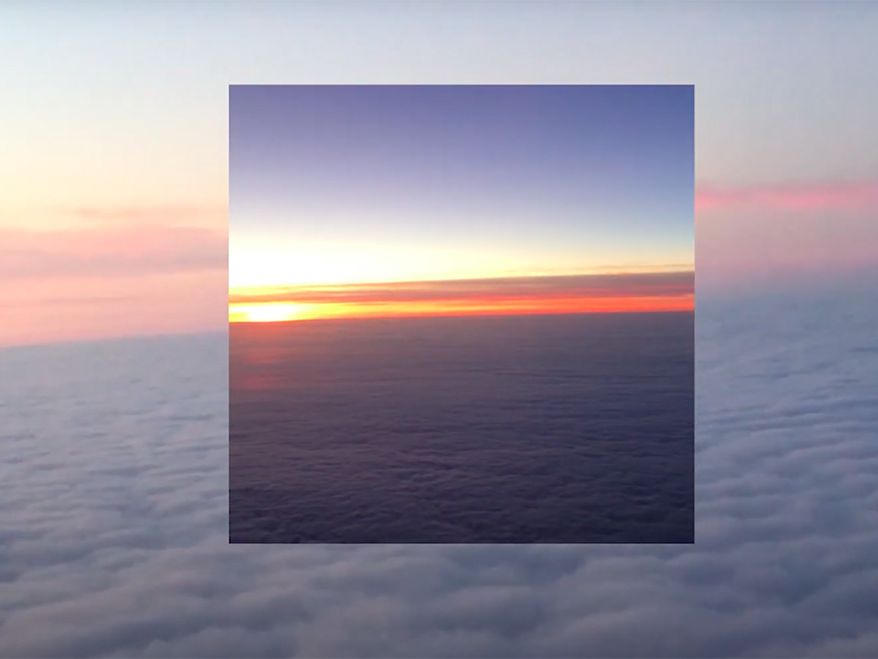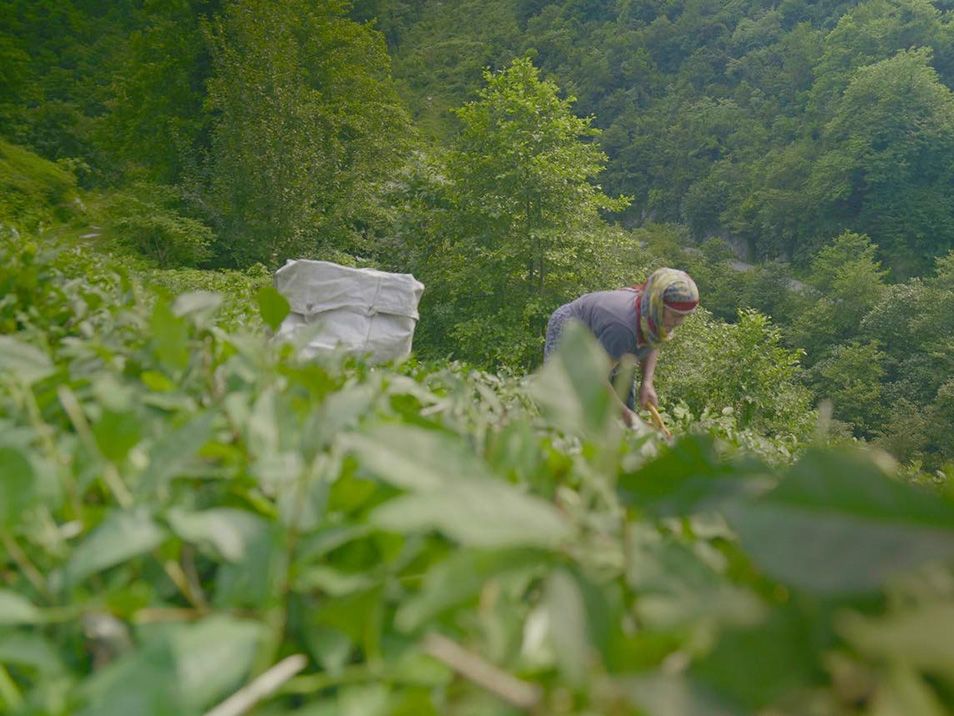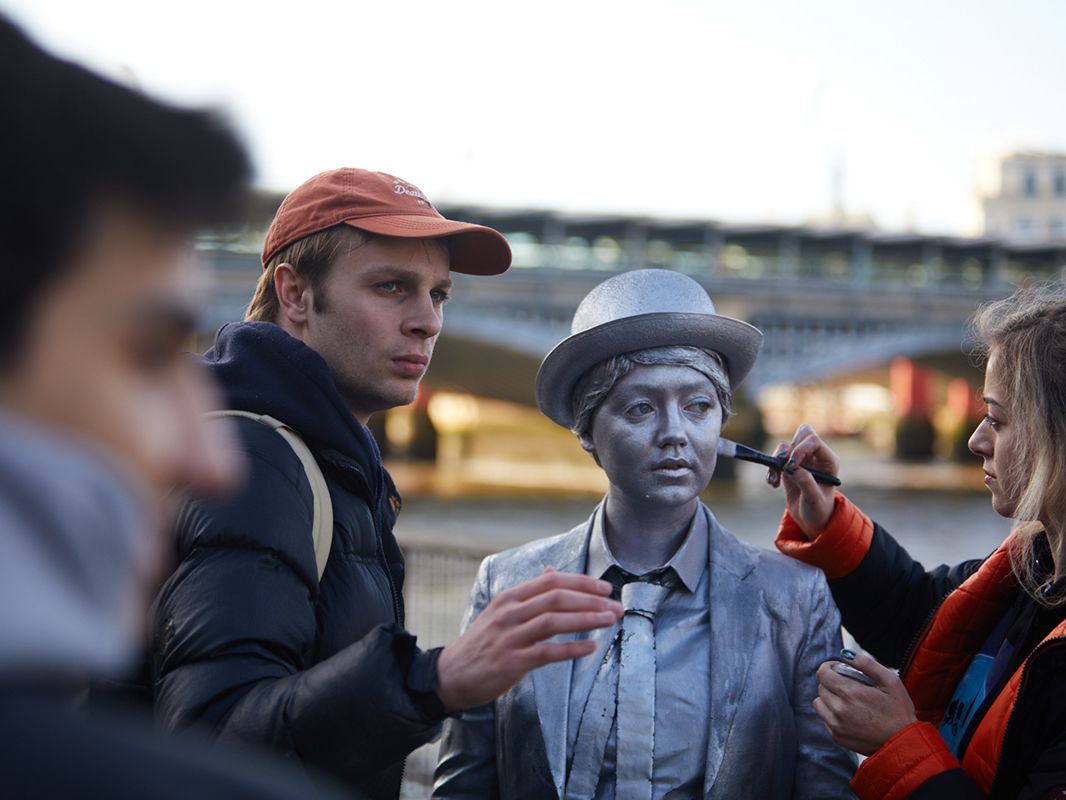
Graduate Voices: Joseph Daly and Stuart Armstrong
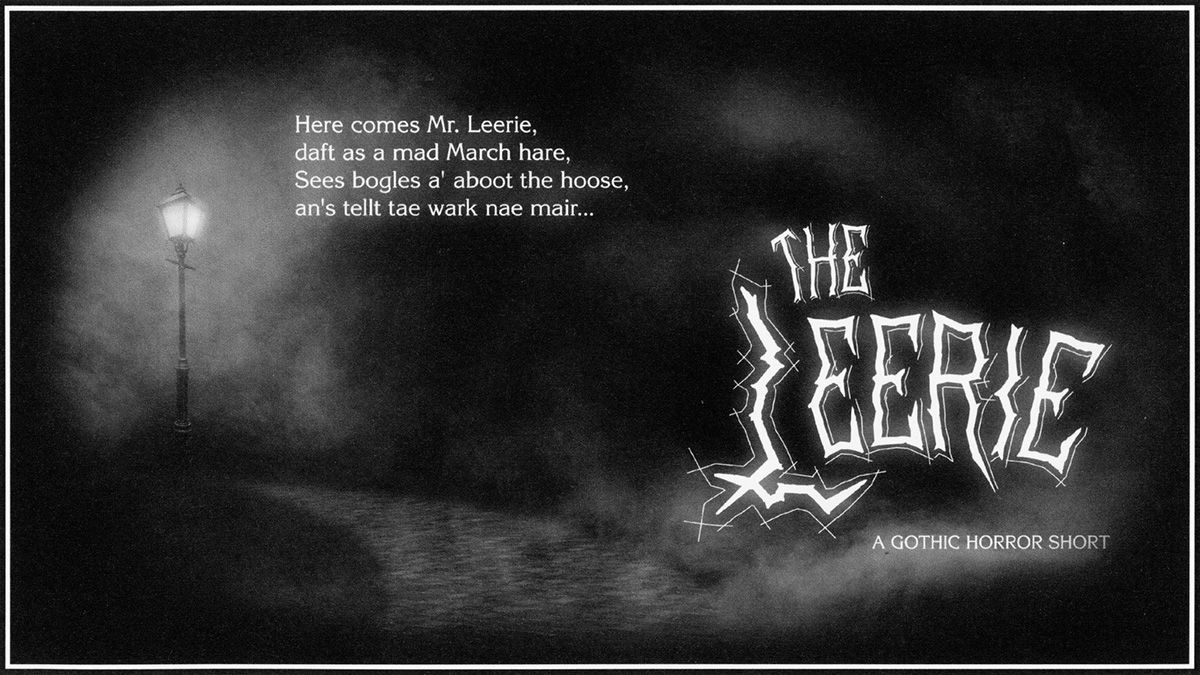
- Written byChloe Murphy
- Published date 09 March 2022

Developed for students who have a passion for independent cinema, BA (Hons) Film Practice at London College of Communication (LCC) is home to an inspiring community of creatives who understand the importance of collaboration in realising a powerful cinematic vision.
Taught by active film practitioners, researchers and industry guests, they explore aspects of both fiction and documentary, gaining experience across a range of filmmaking roles while building material for their future showreels. They’re encouraged to develop ideas, write and pitch scripts, and build their practical skills across pre-production through to delivery and festival entry, and also have opportunities to explore the wider movements and influences that have shaped the landscape of film theory.
By the time they leave LCC, students have gained the tools they need to become creative professionals, innovators and practitioners in the contemporary – and future – screen industries, with previous graduates progressing to work for leading companies such as Netflix, Warner Brothers and the BBC.
Others choose to kickstart their own careers as freelancers, or move on to further study at organisations ranging from the National Film and Television School to postgraduate courses at LCC.
Joseph Daly and Stuart Armstrong
Both Joseph Daly and Stuart Armstrong graduated from BA (Hons) Film Practice in 2018. With a focus on direction, Joe has since worked on projects that have been received at numerous festivals including London Short Film Festival (LSFF), Cambridge Film Festival and BFI Scene, while screenwriter Stuart has launched a freelance career across art direction for music videos and commercials alongside production design for short films.
Together, they’ve spent the past few years working on The Leerie: a period gothic horror in which a Scots lamplighter facing redundancy becomes haunted by nightmarish visions of an electric future. Confronted by a newly-formed Electricity Board and the potential loss of his craft, the eponymous Leerie is forced to face infestations and unearthly spectres in a bid to embrace impending change and prevent his light from being extinguished forever.
Embracing an experimental style influenced by pictorialism and the visuals of other works such as Through A Glass Darkly, The Lighthouse and Eraserhead, the evocative world of The Leerie is complemented by innovative costume design from Eve Oakley and a striking original score by composer Hannah McLoughlin, along with vital support from Director of Photography Spike Morris and producer Kieran Nolan-Jones.
In many ways, the film's development also reflects the nature of the contemporary creative industries, with financing sourced from the BFI Short Film Fund and additional contributions from the Kickstarter crowdfunding platform,
We caught up with Joe and Stuart to discuss their experiences of sourcing inspiration from psychogeography, the joys of collaborating with a creative team, and the influence of LCC on their approach to filmmaking.
The Leerie | Joseph Daly and Stuart Armstrong
Tell us a little bit about your creative practice.
Although it’s important to have an understanding of the likes of story structure etc., the way we write is less about clear intention and more a subconscious process.
We’re both fascinated by topics such as redundant regional dialects, folklore, and personal histories. While we didn’t plan on spending nearly 2 years making an introspective character study about a stubborn, old, Scots-speaking Victorian lamplighter, we’re glad we did.
Why did you apply to BA (Hons) Film Practice at LCC?
We both had an interest in film but didn’t have much of an idea about how to make one, so studying on a course that focused on practical filmmaking felt like a good fit.
Our course leaders and tutors were fantastic guides, and showed us how to put the weird shit from our heads onto film - they must’ve thought themselves successful, as Joseph was asked to return to the course this year to work with Second Years as a directing tutor.
What inspired the idea behind The Leerie?
In October 2019, we’d decided that we wanted to write together, and so spit-balled ideas for a short film script. We were both reading and discussing the short stories of gothic horror writers like Edgar-Allan Poe and Thomas Ligotti, as well the Scots poetry of Robert Louis Stevenson and W. D. Cocker, who wrote The Lamplighter:
Watch the bairn’s expectant een,
Dancin’ tae that measure,
This the show that’s nichtly play’d,
For his special pleasure.
Keekin’ frae his royal throne,
Doon the dark street eerie,
First he sees the distant blink:
“Mammy, here’s the leerie.”
So, our film was born as a sort of homogenisation of these 2 lines of inquiry, fuelled by melancholic psychogeographical walks in Whitechapel and Bethnal Green in East London, and on Blackheath in South East London - an eerie expanse of land where intersecting footpaths are lined with old street lamps.
As a result, our script became a wintery Victorian ghost story/gothic tragedy, with some Scots language thrown in for good measure.

How did you develop your initial concept further?
Our experience at University taught us to be thorough and unforgiving when it came to self-critiquing our work, so the writing process was simple - we got very drunk quite often and took 12 months to write a 14-page script.
Then, in preparation for directing the film - alongside invaluable rehearsal time with the actors - Joseph made the crew watch a long list of black and white films that no one had ever heard of so everyone could be on the same page.
What kinds of funding have you received in order to make your film, and how did you apply for it?
Once we had a screenplay that we were happy with, we applied for various film funds and received some (nice enough) feedback and a few pats-on-the-back, but no cash.
With help from our producer Kieran Nolan Jones, we then applied for the BFI Short Film Fund, and were ecstatic when we got the greenlight.
Our advice to anyone else in the same boat is that you really just have to be patient and trust in your script and pitch doc.
What have you most enjoyed about your experience of developing The Leerie?
Our writing and pre-production process was fun, creative and set us up for the most fulfilling project of our careers thus far. Then, with every brilliant head of department, crew and cast member who joined the project, that excitement and passion was reignited. Working with such a talented and visionary team meant that we were able to craft the short that we envisioned.
The Leerie has also been selected for the London Short Film Festival 2022 which is incredibly exciting, and we’re also waiting on news from Sundance, South by Southwest and Edinburgh film festivals, amongst others.
We both feel the film has been time well spent, and exactly what making a film should feel like. We can’t wait for the next project.
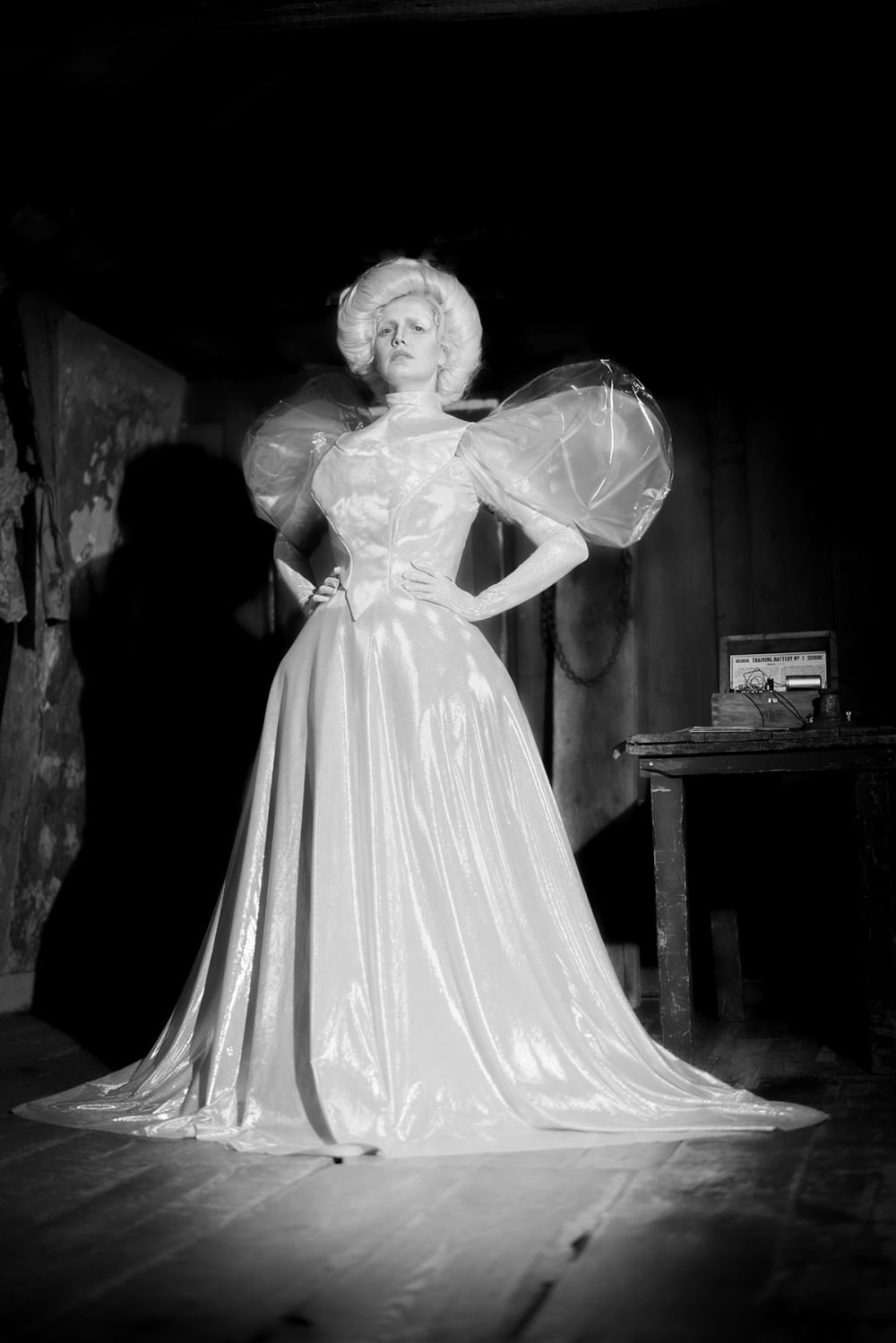
Has this project inspired any further work?
Lockdown was dull. The finished script of The Leerie sat gathering dust, and whilst applying for short film funding, we stumbled upon the Scots Publication Grant offered by the Scottish Book Trust.
We applied for funding to adapt the screenplay into a graphic novel and were successful, so brought illustrator Jack Solomon Smith on-board to illustrate the book after seeing his previous work Pilot, which he published whilst at UAL.
So, we also hope to publish our debut graphic novel this year!
What were the highlights of your time at the College?
The BA (Hons) Film Practice course leaders at the time, Polly Nash and Klaus Fried, along with several of the lecturers we studied with, had a genuine passion and commitment to seeing each of us succeed in our disciplines. Being able to study practical filmmaking under role models who understood that practical industry and storytelling skills were just as important as film theory was invaluable.
Trial and error played a big role in our ability to self-critique - we made a short film every term, and could see our skill and ability growing with each failure. There’ll always be a little Klaus on our shoulder saying: “This doesn’t read,” “Change that title for Christ’s sake,” or “It can always be better.”
What top tips would you give to young filmmakers and storytellers?
Read, drink, watch, listen, consume.
Related links:
- Follow the latest news about The Leerie on Instagram and Kickstarter.
- Find out more about BA (Hons) Film Practice at London College of Communication.
- Experience life at LCC through our interactive Virtual Open Day.
